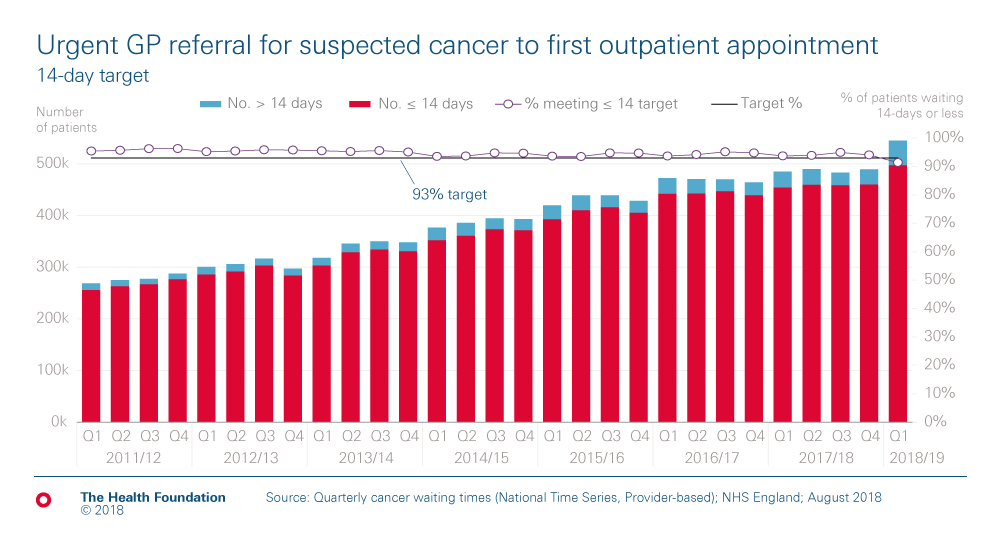14-day cancer waiting times Urgent GP referral to first outpatient appointment standard missed for the first time in England
30 August 2018
- The 14-day waiting time standard from urgent GP referral for suspected cancer to first outpatient appointment has been missed for a whole quarter for the first time since records began in 2008/09.
- 91.4% of patients urgently referred with suspected cancer by a GP met the 14-day target in Q1 2018/19, compared to the 93% standard. There was a total of 544,862 referrals in this quarter, the highest number since records began in 2008/09.
- This data suggests that the health service's capacity to diagnose cancer patients promptly has not kept pace with need.
Latest figures from NHS England show that the 14-day wait standard from urgent GP referral for suspected cancer to first outpatient appointment has been missed for a whole quarter for the first time since records began in 2008/09.
Q1 2018/19 saw 91.4% of patients urgently referred with suspected cancer by a GP meet the 14-day target in comparison to the 93% standard. This is concerning at a time of the year when the NHS should have some respite from winter pressures.
Q1 2018/19 saw the highest number of GP referrals for suspected cancer since records began with 544,862 referrals. This was an 8.2% increase in demand since the previous quarter and a 9.5% increase compared with the same period in 2017/18. Efforts to improve early diagnosis of cancer in England include encouraging GPs to refer more patients on urgent cancer pathways. Whilst more people being urgently referred for investigation by GPs should be a positive step towards improving cancer outcomes, this data suggests that the health service's capacity to diagnose cancer patients promptly has not kept pace with need.
NHS England suggested the increase in GP referrals was at least partly the result of a national breast cancer campaign for women over 70 years of age which ran from 22 February to 31 March 2018. This campaign was expected to increase the number of women referred for both breast cancer and breast symptoms during the campaign period and for a number of months after the campaign, and affect performance against the 14-day waiting time standards.
During Q1 2018/19, two other cancer waiting time standards continued to be missed. 80.8% of patients with suspected cancer started treatment within 62 days of being urgently referred by a GP, which was below the standard of 85% for the 18th consecutive quarter, and the worst quarterly performance against this target since records began. Furthermore, 88.6% of patients referred by an NHS cancer screening programme started treatment within 62 days, below the standard of 90% for the second consecutive quarter and the worst quarterly performance against this target since records began in 2008/09.
Although cancer outcomes in the UK have improved since 2000, survival rates continue to lag behind many comparable countries. Improving survival is likely to be contingent on diagnosing cancers at an earlier stage, when they are more likely to be curable. It is encouraging that more people are being referred from their GP for suspected cancer but it is important that the health service's capacity to diagnose and treat cancer patients promptly keeps pace with this need.
This autumn, the Health Foundation will be publishing an in-depth analysis of the various national plans to improve cancer outcomes in England since 2000. It will shed some light on what national policies have worked well, and what has worked less well, as well as what remains to be done to improve services for people with cancer.
Work with us
We look for talented and passionate individuals as everyone at the Health Foundation has an important role to play.
View current vacanciesThe Q community
Q is an initiative connecting people with improvement expertise across the UK.
Find out more


